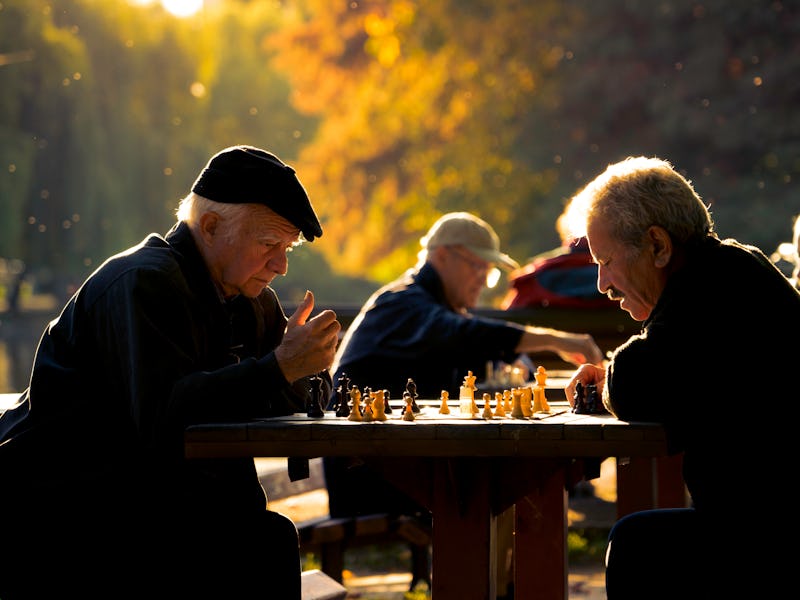Chess Player Study Shows Intelligence Alone Isn't Enough to Become a Master
"Intelligence and practice are intertwined."

Even for someone who’s super smart, becoming a skilled chess player requires lots and lots of practice. By the same token, practice isn’t everything. New research in the journal Proceedings of the National Academy of Sciences suggests that it’s crucial to understand how practice interacts with intelligence if we want understand how a person got to be at the top of their game.
In a paper published on Monday, an international team of researchers outlined the results of a longitudinal study that gathered data on 90 chess players over their lifetimes. By looking at how these factors affect one another, they showed that more intelligent players benefited more from practice. Perhaps more importantly, though, they conclude that there is such a complicated interplay between intelligence and practice when it comes to becoming more skilled, that the effects of these two factors simply can’t be untangled.
To test how intelligence and practice contribute to a player’s skill level, the team used several datapoints collected over at least 20 years of a chess player’s career: the player’s lifetime Elo ratings as well as three intelligence test results and how many games they played. This first factor — which is based on tournament wins — is considered a reliable indicator of a player’s skill level, while the latter two are used as measures of intelligence and practice.
“The present findings corroborate the assumption that both intelligence and practice are, unsurprisingly, important factors in expertise acquisition and retention when considered separately,” write the study’s authors, led by Nemanja Vaci, Ph.D., a postdoctoral research assistant in applied statistics at Oxford University.
“However, their explanatory power lies in the way in which they complement each other. Individually, they can explain only certain parts of the developmental curve. Together, they explain the changes much better across the whole life span, accounting for about 47% of variance.”
Over a lifetime, intelligence and practice are impossible to disentangle as factors that contribute to a chess player's skill level.
By comparison, 34 percent of the variance in chess players’ skill levels could be explained by practice, while intelligence could only explain 5 percent.
In other words, while intelligence and practice can do some of the work of explaining a chess player’s skill, the combined effect of the two factors is much more important for predicting a player’s Elo rating over their lifetime.
While this finding may sound rather intuitive and perhaps even obvious, it complicates the popular hypotheses from intelligence researchers and expertise researchers alike. Researchers in each area have asserted that either intelligence or practice is the only factor determining a person’s skill level — limited to a significant degree by the fact that it’s much easier to analyze statistics when there’s only two variables to consider rather than three.
The researchers acknowledge several limitations of the study, including the fact that informal practice like studying past games and other types of reading aren’t considered, nor is the age at which they started playing. Future studies on the topic would do well to account for these factors.
“Despite these limitations, our study confirms one of the central tenets of virtually all intelligence theories — more intelligent people should benefit more from the same amount of practice than less intelligent people,” they write.
By following chess players’ careers over multiple decades, the researchers also observed a similar effect in how their skill levels decline in old age: They observed that practice alone can’t guarantee that players will stay skilled in old age. The more intelligent a player was, the more practice helped them stay sharp as they got older. On the other side, practice didn’t do as much to help less intelligent players stay as sharp for as long.
“Above all, our study underlines how unfruitful it is to focus on a single factor in the development of human skill,” they write.
“Intelligence and practice are intertwined, thus making it difficult to separate the 2 and pinpoint the exact influence of each factor. Instead, it is much more advisable to identify the circumstances that may help people to acquire and retain important skills.”
Abstract: The relative importance of different factors in the development of human skills has been extensively discussed. Research on expertise indicates that focused practice may be the sole determinant of skill, while intelligence researchers underline the relative importance of abilities at even the highest level of skill. There is indeed a large body of research that acknowledges the role of both factors in skill development and retention. It is, however, unknown how intelligence and practice come together to enable the acquisition and retention of complex skills across the life span. Instead of focusing on the 2 factors, intelligence and practice, in isolation, here we look at their interplay throughout development. In a longitudinal study that tracked chess players throughout their careers, we show that both intelligence and practice positively affect the acquisition and retention of chess skill. Importantly, the nonlinear interaction between the 2 factors revealed that more intelligent individuals benefited more from practice. With the same amount of practice, they acquired chess skill more quickly than less intelligent players, reached a higher peak performance, and arrested decline in older age. Our research demonstrates the futility of scrutinizing the relative importance of highly intertwined factors in human development.